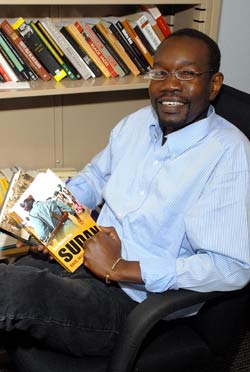| 12-26-2017, 01:22 AM |
Amir H. Idris
 Amir H. Idris Amir H. Idris
Registered: 08-31-2014
Total Posts: 11
|
|
 FORGET CEASEFIRES AND FORUMS, SOUTH SUDAN CAN ONLY FIND PEACE IF LEADERSHIP CHANGES FORGET CEASEFIRES AND FORUMS, SOUTH SUDAN CAN ONLY FIND PEACE IF LEADERSHIP CHANGES
|
01:22 AM December, 25 2017 Sudanese Online
Amir H. Idris-
My Library
Short URL
BY AMIR IDRIS ON 12/22/17 AT 17:16 PM
https://www.newsweek.co.uk/forget-ceasefires-forums-south-su...rship-changes-534964
OPINION
Two years after the signing of the August 2015 peace agreement, South Sudan continues to suffer from widespread human rights violations, including killings, rapes, and aid access restrictions.
Tens of thousands of people have been killed; two million people have fled the country in the largest civilian displacement in the recent history of Africa's political violence, and more than 200,000 people still shelter in United Nations camps. Efforts at peace deals and permanent cease-fires have failed since the war began in December 2013.
The government and rebel groups signed another ceasefire on Thursday (December 21) in the latest attempt to end the four-year civil war and allow humanitarian access. The truce, due to start on Saturday, was agreed during a High Level Revitalization Forum (18-22 December) held in Ethiopian capital Addis Ababa.
The new ceasefire, however, will mean very little, unless the country implements a credible political process to end its man-made human tragedy.
The various opposition groups lack a coordinated strategy to change the regime in Juba and undertake the enormous economic and political reforms in the country.
For the revitalization forum to succeed, the IGAD (Intergovernmental Authority on Development) and the international actors including the Troika countries, the U.S., the U.K. and Norway, need to change course.
It seems that the Troika countries, especially the U.S., continue to view the IGAD leadership as a catalyst to resolve South Sudan's crisis.
There are two problems with this approach. First, it regionalizes South Sudan's crisis rather than acknowledging its complex national context. Second, it renders the agency of the people of South Sudan as irrelevant by giving the regional powers the upper hand to frame the root causes of the crisis.
In fact, South Sudan's crisis has been worsened by the tenuous relationship between the IGAD countries and the geopolitics of the restive region. For instance, Sudan, Ethiopia, and Uganda have been competing to determine the future of South Sudan. Hence, the narrow framing of the conflict and the absence of a unified IGAD leadership towards the resolution of the conflict has contributed to the failure of the implementation of the 2015 peace agreement in the first place.
The reality is that South Sudan is a failed transition because of the failure of its political elites to provide an inclusive vision that could have taken the country on a prosperous path after independence in 2011.
Instead, they treated independence as an opportunity to steal public funds, to practice nepotism, to undermine law and order, and to sow ethnic divisions at the expense of shared national ideals and common institutions. Therefore, there can be nothing worthy of consideration if the IGAD revitalization forum is expected to simply retain the same political elites who mercilessly subverted democracy to cling to power and extract mineral resources.
The damages that are being inflicted on the social fabric of the society, the absence of trust in government, as well as the growing feeling of revenge and counter revenge should persuade the IGAD and the international community, in particular the U.S., China and Russia, to rise above their vested interests to save South Sudan.
South Sudan is a rich country endowed with abundant natural resources, including oil reserves, gas and gold. Instead of prosperity, South Sudan's mineral wealth has brought only poverty, death, and a chorus of political and military elites eager to enrich themselves at the expense of their own impoverished people.
Its economy has virtually collapsed with no sign of recovery in the short term. Its civil servants have not received their salaries for more than six months. The government is no longer in a position to fulfill its international financial obligations. The sovereignty of the country is reduced to the capital city, Juba, while much of the country remains under the control of divided armed opposition groups.
Giving the dysfunctional status quo in Juba and the unimaginable loss of lives and resources, the region and the international community should recognize that the desirable option to end the cycle of violence is to break up the domination of the failed government by unscrupulous political elites.
South Sudan has no chance of peaceful political transformation unless the edifice of the political leadership, which has been in power since 2005, is brought down and excluded from any proposed interim government.
If the revitalization forum fails to strike a new inclusive peace agreement to end the conflict, the USA, the United Nations and the African Union (AU) should move beyond the narrow understanding of sovereignty, and territorial integrity and contemplate an alternative hybrid African UnionвҖ“UN model of governance for South Sudan to save the country from breaking up completely into warring entities.
Amir Idris is a South Sudanese academic and professor and chair of Department of African and African American Studies at Fordham University, New York City.
|
|
   
|

|

|

|
|
|